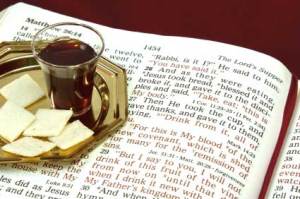I am a Baptist, (namely, a Reformed Baptist),[1] not because I was raised to be so, nor because I’ve neglected to study the theological issues that divide Baptists and those of other denominations. No, I am a Reformed Baptist by conviction. That means, I’ve studied the issues and can confidently say that I am convinced of what I have believed as being thoroughly biblical. And while I have the highest respect for my Paedobaptist brethren, especially those of the Presbyterian denomination, I cannot bring myself to accept the practice of infant baptism as an apostolic, biblical teaching/practice. It is, to paraphrase the words of Christ, pouring new wine into old wineskins (Mtt. 9:17). Alan Conner, in his book, Covenant Children Today: Physical or Spiritual?, notes this as a crucial point in the debate over infant baptism and covenant membership.
Covenant Membership the Key Issue
The general view set forth in these Confessions [i.e Heidelberg Catechism; Second Helvetic Confession; Westminster Confession of Faith] is that the infants of believers are in the New Covenant, are members of the church, and therefore, should be baptized. If this principle of infant membership is found in the New Covenant, then infant baptism has a strong ally. But, if the New Covenant presents a different principle of membership, one based on personal faith in Christ and actually possessing the blessings of the New Covenant, then infant baptism comes up against a powerful foe. Without the principle of infant membership, the view of infant baptism expressed in the Confessions above would suffer a major and perhaps irrecoverable blow.
New Wine in Old Wineskins?
Credobaptists believe that baptizing infants based on the principle of membership in the Old Covenant is similar to the faulty practice of trying to ‘pour new wine into old wineskins.’ The concept of membership in the New Covenant cannot be poured back into the old worn out wineskins of the Old Covenant. We believe that those who practice infant baptism do not take seriously enough that the New Covenant is, in fact, a ‘New’ Covenant, not like the Old Covenant (Jeremiah 31:31-32). We affirm that there are important elements of both continuity and discontinuity [added emphasis] between the Old and New Covenants. Yet, the practice of infant baptism is based upon a mistaken view of continuity in the area of covenant membership.
We also believe that the principle of membership taught in the New Covenant is at the heart of its essential ‘newnewss.’ No longer is membership in the New Covenant defined by the genealogical principle of the Old Covenant. For, as Paul taught, ‘be sure that it is those who are of faith who are sons of Abraham’ (Galatians 3:7) and ‘it is not the children of flesh who are children of God, but the children of the promise are regarded as descendants’ (Romans 9:8). These ‘children of promise’ are determined not by physical lineage, but by the sovereign choice of God who chooses Isaac over Ishmael and Jacob over Esau (Romans 9:9-13). The New Covenant ‘children of God’ are not those ‘born of blood, nor of the will of the flesh, nor of the will of man, but of God’ (John 1:12-13). Thus, Old Covenant membership was based on physical birth, whereas in the New Covenant it is based exclusively on spiritual birth from above (John 3:3,5).
If these convictions are true to the teachings of the Bible, then membership in the New Covenant is restricted to those who have faith, and they alone should receive the covenant sign of baptism. This is a clear departure from membership in the Old Covenant, but it is one made necessary by the fact that new wine requires new wineskins.
The rest of Conner’s book is essentially an argument or justification for the above quote. Throughout, he demonstrates the clear biblical shift from an emphasis on the physical principle, characteristic of the Old Covenant, to the spiritual principle, characteristic of the New Covenant. This is a book that every Reformed Baptist should read. Of course, I do believe that paedobaptists should take the time to read such books as well, so as to better understand the Reformed Baptist position and conviction.
Happy reading…
[1] I do not mean merely a Calvinistic Baptist (i.e. a Baptist who’s “Reformed” convictions extends no further than the Doctrines of Grace). I know that there are those who would say that Baptists can’t truly be Reformed or Covenantal, because we don’t practice infant baptism. To that I reply, why do you have such a small view of Reformed/Covenantal theology? Infant baptism, as important as it may be in paedobaptist Covenant Theology, is not the be-all-end-all of the Reformed faith. What is more, this often comes from the lips of one who knows little to nothing of Reformed Baptist Covenant Theology, and the various arguments that exist for it.
 Although James Montgomery Boice was a Presbyterian minister, there is yet much that we Baptists and our Presbyterian brothers have in common. Far too often we tend to speak only of the differences that exist between us (e.g. the recipients of baptism; church polity). In this post we will see Boice’s explanation of the four elements of a sacrament/ordinance.
Although James Montgomery Boice was a Presbyterian minister, there is yet much that we Baptists and our Presbyterian brothers have in common. Far too often we tend to speak only of the differences that exist between us (e.g. the recipients of baptism; church polity). In this post we will see Boice’s explanation of the four elements of a sacrament/ordinance.